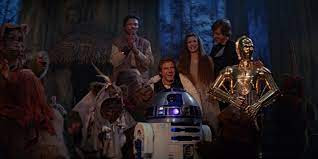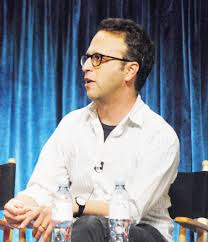 |
| The Big Chill ensemble |
Do you think it was the Star Wars films that you wrote or films like The Big Chill and Grand Canyon that have given you the freedom to more or less do what you want?
Body Heat, Big Chill, Accidental Tourist, Grand Canyon, these were movies that were unusual for Hollywood. They did well enough and they were well-received by the critics. Those are the things that have given me my freedom, you know.
The big blockbusters that I wrote, including one that was an original of mine but that I didn’t direct, The Bodyguard: those things are on your resume, everybody remembers them, but they have nothing to do with my directing career really.
Except for the fact that after I had written Raiders of the Lost Ark and The Empire Strikes Back, when I said to the studio head, ‘I am not gonna write any more. I’m gonna direct,’ because I had written these two big hits, he was much more receptive. I wrote Body Heat to be my first directing job and I haven’t really gone back since then. And if I had not had a success as a director, I wouldn’t be able to do what I do.
Everybody’s career is a question of ‘Was the last thing successful enough for you to control your destiny?’ Not ‘Was it good? Was it bad?’ Who knows? I think only time can tell that. It’s like, were there enough positive things around it so that you can go in and say, ‘I have another thing I wanna do’?
 |
| Loren Dean, Hope Davis, Mumford |
Why didn’t Mumford work in the US?
I think it was crazy. They should never have made it. It was made by Disney. Joe Roth was running the company at the time. I’d made Grand Canyon with him and we had been very successful with that. It was sort of an offbeat movie for a studio to make. And I think that out of friendship or whatever, he agreed to make this movie for a very low price. I gave up all my salary. Everybody worked cheap and we made the movie very economically.
It tested very well but was not easy to sell and was certainly outside the experience of Disney, which has only succeeded with high-concept material. At that time, Joe Roth left the studio and the movie became a kind of orphan. And it was not an easy film to begin with because it’s not what’s happening in American movies. I had a non-star vehicle, a gentle ensemble comedy about people’s identities. You could take that description to any studio today and they’d all kick you out the door. There was no effort to sell it and they didn’t really distribute it overseas.
 |
| Alfre Woodard, Jason Lee, Mumford |
If Tom Cruise had played Mumford, it might’ve worked. It was a very tough movie to sell and sometimes that kind of movie is very hard to get a movie star for. But if you could, it’s the only thing that could carry it. It’s a very low concept, very gentle, very European, I think.
Yes. It’s a film I’ve got an affection for.
Thank you. I’m glad. You know, it’s a funny thing, Tom. I go all over the world and, when you have a long career, you carry a bunch of injuries and regrets and also some pride in what you’ve created. As I go around – it doesn’t matter where I am – people come up to me and they’ll have some movie that they like. The movie could have flopped terribly in the United States, but because of video, or because of foreign distribution, they may have this affection for I Love You to Death [1990] or there are a lot of Silverado fans, or people will come up to me about Grand Canyon. And you realise that these movies have a life long after your immediate thrill or disappointment and people do relate to them in a personal way.
When I was in Europe, I had a lot of people tell me that about Mumford, but as far as I was concerned Mumford never got a release in Europe. So the fact that they were seeing it anyway was delightful and the fact that they liked it was great. I do still have a bruise from it not being released, sold and supported. But I do think that the reality of Hollywood is that that kind of movie can’t really be made. Maybe independently, but then you pretty much know that it’s not going to be seen by many.
 |
| Return of the Jedi ensemble |
To look at another of my favourite films of yours, The Big Chill: have you considered a 20 years-on sequel?
(Chuckles) I’ve been asked many times, but, you know, I’m not actually a fan of sequels. I wrote Return of the Jedi for George Lucas because he had been very supportive of me and had helped me to get to direct Body Heat. So he’d been good to me and he asked me as a favour. He was in a hole doing Return of the Jedi and so he asked me, just as he’s asked me to do all of these other movies since then. But I don’t really like sequels. I think there are so many movies to be made, I don’t really understand the attraction of sequels. It’s obviously purely a business proposition. I’m not sure anyone wants to know where these people are now.
Um. I do.
(Laughs)
I had a real affection for the characters and they’re still alive in my consciousness. And surely there’s a story to be told about where these baby boomers have ended up at the beginning of the 21st century?
Yes. I’m interested in that. But I don’t know if I’m the person to tell it.
 |
| Cast reunion, The Big Chill |
I sensed your empathy for those characters through the film. Why would you let them go?
I do have an empathy for them. I think they’re foolish and they’re funny and they’re very much like people I know, real people. They’re not always smart and they’re not always good and they’re very human.
One of the criticisms that was always directed at the film, wrongly I believe, was that these characters were never real ’60s radicals…
(Chuckles)
…. whereas my view was that that was part of the point of the film.
It is. But the closer you get to ’60s radicals, you realise there were no real "’60s radicals". There were people who did things passionately, as these people did, at the time. There aren’t too many surviving, you know. You only hear that objection from people, I think, who have a misguided sense of their own selves. These people in the movie have drifted, but it’s impossible to tell how sincere they were at the time. Obviously there was a variety of commitment the way there is in any group, and it seems presumptuous to me for people to say that they weren’t real radicals but we were.
Aside from Dreamcatcher, which are the babies you care most about?
You know, I really do care about all of them. The ones that have been difficult releases, where you’ve done a lot of hard work and they haven’t been well-received, you hold them dearest sometimes. Each one represents at minimum a year, sometimes two years of my life. That’s why the current system where the judgement is over on Friday afternoon of the first Friday of a film’s release, where it’s decided whether it does or it doesn’t work commercially, is a very rough system. It batters people. It really does. Nobody’s trying to make a bad movie. Everybody thinks they’ve done pretty well at the time they give it to the world. And when the world rejects it, it’s traumatic.
I don’t have a favourite. I’ve directed ten movies and each one represents a period in my life and a group of people that I worked with who’re still important. And I have two sons and I love ’em both. And they’re very different.
 |
| Jonathan Kasdan |
 |
| Jake Kasdan |
Although one of them at least is in the movies.
That’s right. And the other one is writing television and will soon be in movies I think.
Apart from being an inspiring parent and role model, have you worked with your sons in any way?
No. I can’t get ’em to work with me. Jake has, wisely I think, created a career independent of me and directed Zero Effect when he was 22 years old: way ahead of the schedule I was on. And with no help from me whatsoever, he went out, he wrote a script and he got someone to let him direct it which was sort of mind-boggling.
 |
| Ben Stiller, Bill Pullman, Zero Effect, (Jake Kasdan, 1998) |
And he directed another movie after that which was very successful here (Orange County) and a lot of the kind of television where you create the show, although I don’t think he’s gonna do that anymore. He’s very much in demand for that because he was associated with Freaks and Geeks, a show that was very well-received here.
I didn’t do anything to help him, and the younger one, Jon, is doing the same thing. I haven’t helped him. All I’ve done is be encouraging and supportive, but neither of them has worked with me really and I would love to have them work with me. But I think it’s important to them to establish themselves without any association with me. Maybe they’re just ashamed of me.
From a distance, given the reference points shared by Jake’s Zero Effect and your Body Heat, it’s pretty clear that the son was going to follow in the father’s footsteps?
It’s very interesting that he came upon such an idea. When he was so young, he wrote this script that was a perfect metaphor for the difficulty of moving from being an observer to a participant, you know. And that’s what Zero’s problem is: he’s a brilliant observer who has a lot of trouble talking to people, becoming emotionally involved with them. I thought that was an amazing metaphor for a 21 year-old to come up with, and in a very entertaining way. And then he went out and directed the movie very well. So I was very impressed with that. I didn’t see it relating to Body Heat which was about very different issues for me.
I was thinking more in terms of the reference points: the private-eye story, the hard-boiled connections…
I’m still fascinated by that. I’d still like to do a regular detective movie. I love those movies. I’ve been reading a lot of that fiction. It got to me when I was very young and I’ve never been able to shake it. The genre is a wonderful springboard that lets you tell a lot of different stories.
************************
Editor's Note: This is a second part of an interview with the American film-maker Lawrence Kasdan. It was recorded by Melbourne film critic Tom Ryan in 2003 as the basis of a feature article for The Age. The first part can be found IF YOU CLICK HERE. Previous posts in this series have been devoted to Costa-Gavras Jonathan Demme (Part One) Jonathan Demme (Part Two) Click on the names to read the earlier pieces
No comments:
Post a Comment
Note: only a member of this blog may post a comment.